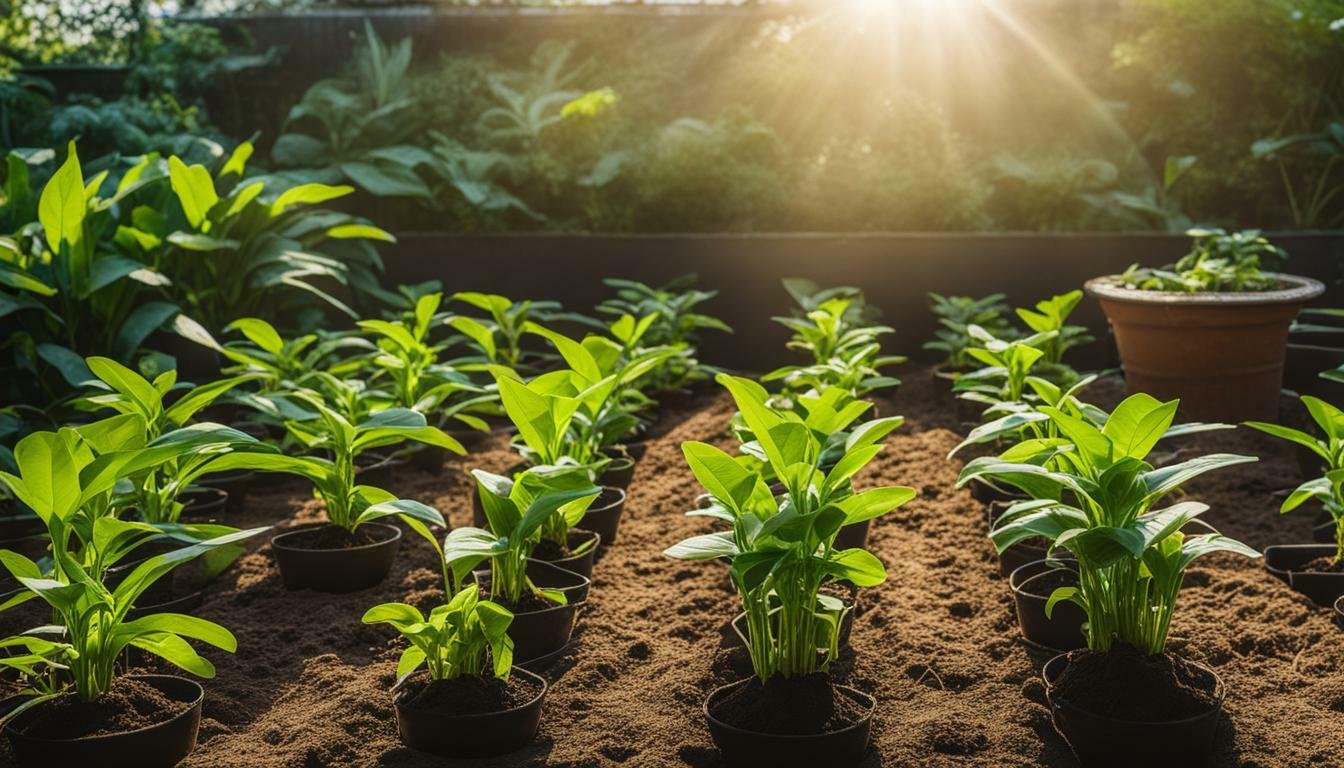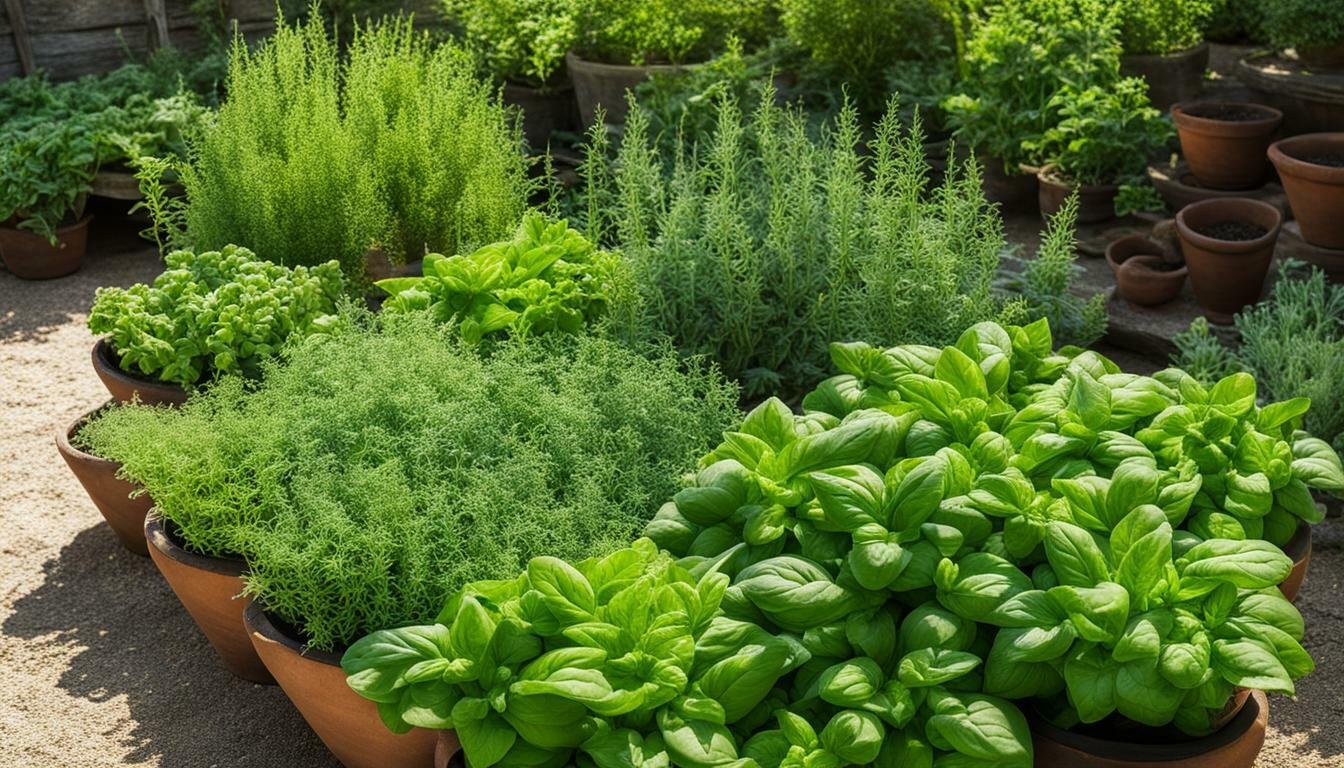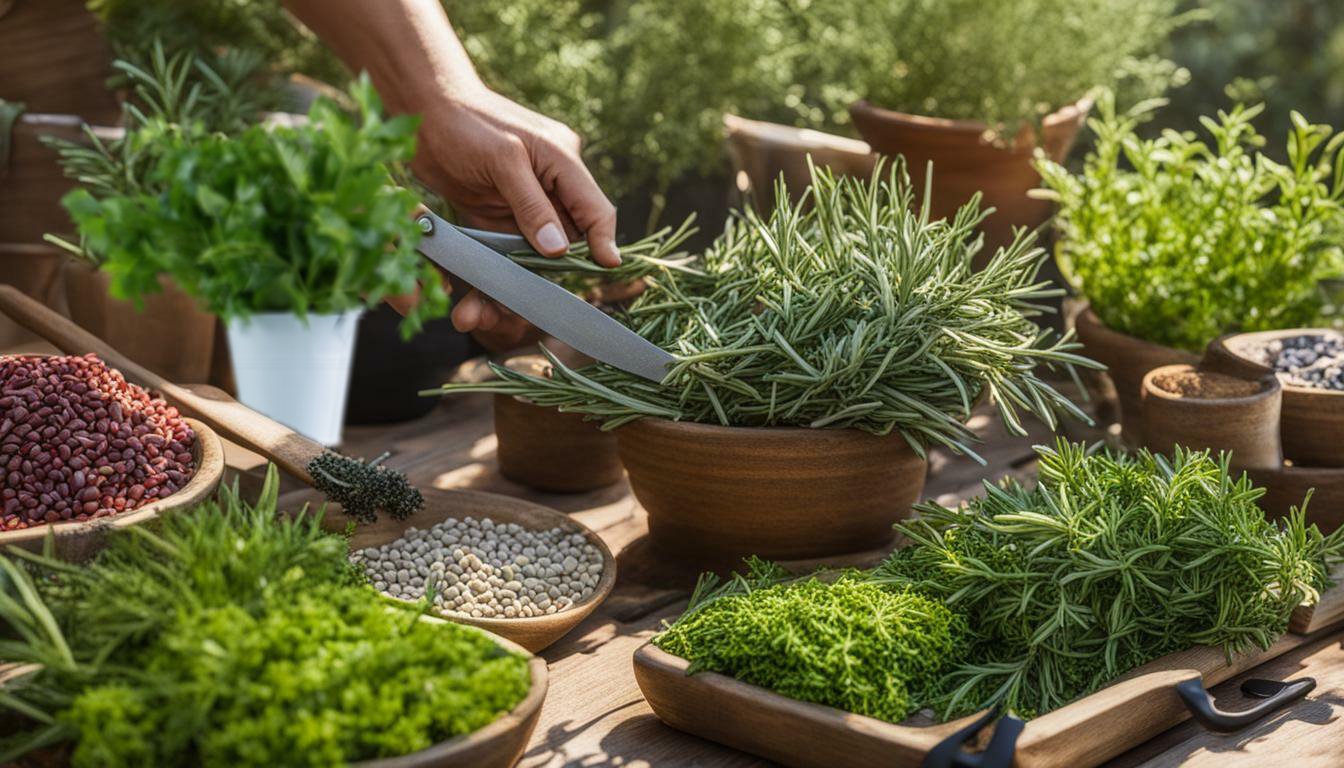Grow Herbs for Thai Cuisine
Are you ready to embark on a culinary journey and master the art of Thai cooking? Discover how to grow herbs for Thai cuisine right in your backyard with our comprehensive guide.
Factual data: Growing herbs for Thai cuisine is an accessible and rewarding activity that can be done in any space, no matter how small. Many herbs used in Thai cooking can be grown throughout the United States, using methods such as storing bulbs indoors for winter or growing frost-tender plants in containers. Some common Thai vegetables that can be grown include okra, sweet potatoes, arrowroot, luffa, Thai peppers, yard-long beans, Thai eggplant, and cucumbers. Popular Thai herbs and spices to grow include turmeric, ginger, galangal, Makrut lime, garlic, lemongrass, basil, mint, rosemary, thyme, parsley, chives, cilantro, and oregano. Herb gardening offers numerous benefits, including enhancing culinary experiences, improving health and wellness, and being cost-effective. Tips for successful herb gardening include choosing a sunny location, using quality soil with organic matter, starting with potted plants or seeds, watering appropriately, and regular pruning and harvesting. Overall, cultivating herbs for Thai cuisine is a delightful way to connect with nature and enhance your culinary creations.
Key Takeaways:
- Growing herbs for Thai cuisine can be done in any space, regardless of size
- Popular Thai herbs and spices include turmeric, ginger, lemongrass, basil, and mint
- Thai vegetables such as okra, sweet potatoes, and Thai eggplant can also be grown
- Herb gardening enhances culinary experiences, improves health, and is cost-effective
- Successful herb gardening requires a sunny location, quality soil, and regular maintenance
To recreate the vibrant flavors of Thai cuisine, it’s crucial to have the right herbs in your garden. Let’s explore the best herbs for authentic Thai dishes and discover how to grow them at home.
Thai cuisine is renowned for its bold and aromatic flavors, and the secret lies in the use of fresh herbs and spices. By growing these herbs in your own garden, you can elevate your cooking to new heights and add an authentic Thai touch to your dishes.
One of the most versatile herbs used in Thai cooking is basil. Thai basil has a unique flavor profile, with hints of anise and licorice. It pairs beautifully with dishes like Pad Thai, curries, and stir-fries. Another popular herb is lemongrass, known for its citrusy and slightly floral aroma. Lemongrass is a staple in Thai soups and curries, imparting a refreshing and zesty flavor.
Other essential Thai herbs include mint, cilantro, and Thai chilies. Mint adds a cool and refreshing element to salads and summer rolls, while cilantro adds a fresh and citrusy taste to Thai salads and noodle dishes. Thai chilies, on the other hand, bring the heat to Thai curries and stir-fries, adding a fiery kick to your meals.
| Herb | Flavor Profile | Common Uses |
|---|---|---|
| Thai Basil | Anise and licorice | Curries, stir-fries, Pad Thai |
| Lemongrass | Citrusy and floral | Soups, curries, marinades |
| Mint | Cool and refreshing | Salads, summer rolls, teas |
| Cilantro | Fresh and citrusy | Salads, noodle dishes, curries |
| Thai Chilies | Fiery and spicy | Curries, stir-fries, sauces |
These are just a few examples of the incredible herbs you can grow for authentic Thai dishes. By having these herbs readily available in your garden, you can infuse your cooking with the vibrant flavors of Thailand and impress your family and friends with your culinary skills.
With a little care and attention, you can easily grow these Thai culinary herbs at home. They thrive in sunny locations with well-draining soil. Whether you have a full-sized garden or a small balcony, you can create a thriving herb garden that will supply you with an abundance of fresh flavors.
So, roll up your sleeves, get your hands dirty, and start growing the best herbs for your favorite Thai dishes. Your taste buds will thank you, and you’ll be one step closer to mastering the art of Thai cuisine.
Thai Vegetables for a Complete Culinary Experience
Enhance your Thai culinary experience by growing not only herbs but also authentic Thai vegetables in your garden. Let’s explore the variety of Thai vegetables that can be easily grown at home.
When it comes to Thai cuisine, vegetables play a significant role in adding flavor, texture, and nutrition to your dishes. Growing your own Thai vegetables ensures that you have access to fresh, organic produce that is essential for creating authentic flavors in your favorite recipes. Plus, it’s a rewarding and cost-effective way to enhance your culinary creations.
Here are some popular Thai vegetables that you can easily grow in your own garden:
| Vegetable | Description |
|---|---|
| Okra | A versatile vegetable with a unique texture, ideal for stir-fries and soups. |
| Sweet Potatoes | Rich in vitamins and minerals, these flavorful tubers can be roasted, mashed, or used in curries. |
| Arrowroot | A starchy vegetable used as a thickening agent in Thai soups and sauces. |
| Turmeric | A bright orange root with a warm, earthy flavor, commonly used in curry pastes and as a natural food coloring. |
| Makrut Lime | The leaves and zest of this citrus fruit are widely used in Thai cooking to add a refreshing, aromatic flavor. |
| Thai Eggplant | Small, round eggplants that are perfect for curries and stir-fries, with a slightly bitter taste. |
| Cucumbers | Refreshing and crisp, cucumbers are widely used in Thai salads and pickles. |
By cultivating these Thai vegetables alongside your herbs, you can create a truly authentic Thai culinary experience in your own kitchen. Whether you have a small garden or limited space, these vegetables can be grown in containers or small raised beds, making them accessible to all.
The versatility of Thai vegetables allows you to experiment with a wide range of flavors and textures. From spicy Thai peppers to crunchy yard long beans, there are endless possibilities for creating delicious and nutritious Thai-inspired dishes.
Don’t limit yourself to just using these vegetables in traditional Thai recipes. Incorporate them into your everyday cooking to add a touch of Thai flair to your favorite dishes. Try grilling Thai eggplants and serving them with a tangy dipping sauce, or toss roasted sweet potatoes with Thai basil for a unique side dish.
Remember to harvest your vegetables when they are at their peak of freshness for the best flavor. With a little care and attention, your Thai vegetable garden will provide you with a bountiful harvest that will elevate your culinary adventures to new heights.
Essential Tips for Successful Herb Gardening
Ready to put your green thumb to work? These essential tips will ensure that your Thai herb garden thrives, regardless of your gardening experience. Whether you have a vast backyard or a small balcony, growing herbs for Thai cooking is an accessible and rewarding activity that can be enjoyed by anyone.
First, choose a sunny location for your herb garden. Most Thai herbs thrive in full sun, so make sure to select a spot that receives at least six hours of direct sunlight each day. If you don’t have a suitable outdoor space, don’t worry! Many herbs can also be grown indoors on a sunny windowsill or under grow lights.
Next, prepare high-quality soil with organic matter. Thai herbs prefer well-draining soil that is rich in nutrients. You can improve the soil’s fertility by adding compost or organic fertilizer. Avoid using synthetic fertilizers, as they may impact the flavor and aroma of your herbs.
When it comes to planting, you have two options: starting with potted plants or seeds. If you’re new to gardening, potted plants are a convenient and time-saving choice. Just make sure to select healthy plants from a reputable nursery. If you prefer to start from seeds, follow the instructions on the seed packet for optimal germination. Keep in mind that some Thai herbs, such as lemongrass and galangal, are easier to grow from established plants.
To ensure your herbs thrive, water them appropriately. Most Thai herbs prefer consistently moist soil, but avoid overwatering, as it can lead to root rot. Water your herbs when the top inch of soil feels dry to the touch. It’s also important to regularly prune and harvest your herbs. This helps promote growth and prevents them from becoming leggy.
Now that you have the essential tips, why not start your own Thai herb garden? It’s a wonderful way to connect with nature, enhance your culinary creations, and embrace the flavors of Thai cuisine. So roll up your sleeves, get your hands dirty, and watch your herbs flourish!
Helpful Tips for a Successful Thai Herb Garden:
- Choose a sunny location with at least six hours of direct sunlight daily.
- Prepare well-draining soil enriched with organic matter.
- Consider starting with potted plants if you’re new to gardening.
- Water your herbs when the top inch of soil feels dry.
- Regularly prune and harvest your herbs to promote growth.
Remember, growing herbs for Thai cooking is a journey of discovery and experimentation. Don’t be afraid to try different varieties and techniques to find what works best for you. Before you know it, you’ll be enjoying the flavors and aromas of freshly harvested Thai herbs in your own kitchen!
| Common Thai Herbs | Common Thai Vegetables |
|---|---|
| Basil | Okra |
| Mint | Sweet Potatoes |
| Lemongrass | Arrowroot |
| Ginger | Luffa |
| Galangal | Thai Peppers |
| Makrut lime | Yard Long Beans |
| Garlic | Thai Eggplant |
| Rosemary | Cucumbers |
| Thyme | |
| Parsley | |
| Chives | |
| Cilantro | |
| Oregano |
Aside from adding sensational flavors to your dishes, growing your own Thai herb garden offers remarkable health benefits and proves to be a cost-effective choice. Using fresh herbs in your cooking not only enhances the taste of your meals but also provides various health advantages. Thai herbs are rich in vitamins, minerals, and antioxidants that can boost your immune system, improve digestion, and contribute to overall well-being.
For example, turmeric, a staple in Thai cuisine, is known for its anti-inflammatory properties and has been shown to support brain health and reduce the risk of chronic diseases. Lemongrass, another popular Thai herb, aids in digestion, relieves anxiety, and may even help lower blood pressure. Basil, mint, and cilantro offer fresh flavors while providing essential nutrients like vitamin C, vitamin A, and iron.
By growing your own Thai herb garden, you can ensure that the herbs you use are fresh, free of chemicals, and readily available whenever you need them. This not only saves you money on buying expensive store-bought herbs but also allows you to fully appreciate the vibrant flavors and aroma that fresh herbs bring to your dishes. Plus, having your own herb garden adds a touch of greenery and beauty to your home or outdoor space.
| Health Benefits of Thai Herbs | Cost-Effectiveness of Growing Your Own Herb Garden |
|---|---|
|
|
So why not embark on your herb gardening journey and experience the joy of growing your own Thai herbs? Whether you have a backyard garden or limited space on your balcony, you can create a thriving herb garden that will enrich your culinary creations and promote a healthier lifestyle. With a little care and attention, you’ll be able to enjoy the flavors and benefits of fresh Thai herbs all year round.
“There is nothing more satisfying than picking fresh herbs from your own garden and using them in your cooking. It adds a special touch to every meal and allows you to connect with nature in a meaningful way.” – Jane Doe, Herb Enthusiast
Overcoming Climate Challenges: Growing Thai Herbs in Any Region
Regardless of your geographical location, you can overcome climate challenges and grow exotic Thai herbs right in your backyard. Let’s explore some innovative techniques to make it happen.
One method to tackle climate limitations is by storing bulbs indoors during the winter. Herbs like turmeric, ginger, and galangal can be dug up from your garden and stored in a cool, dry place, like a basement or garage. Alternatively, you can pot them up and bring them indoors, ensuring they receive enough sunlight. This way, you’ll have a fresh supply of these aromatic herbs all year round.
“Storing bulbs indoors during the winter ensures a fresh supply of aromatic herbs all year round.”
Another solution is to grow frost-tender plants in containers. This allows you to move them indoors during colder months or protect them with covers when frost threatens. Thai herbs like Makrut lime, lemongrass, and basil can flourish in pots, allowing you to enjoy their distinctive flavors even in colder regions.
Table: Thai Herbs that Thrive in Different Climates
| Climate Type | Recommended Thai Herbs |
|---|---|
| Tropical | Thai basil, lemongrass, Makrut lime, galangal, turmeric |
| Subtropical | Ginger, Thai chilies, coriander, mint, holy basil |
| Mediterranean | Rosemary, thyme, oregano, parsley, chives |
By selecting herbs that thrive in your particular climate, you can ensure a successful and bountiful harvest. Remember to provide adequate sunlight, water, and well-draining soil for your plants to truly flourish.
With a little creativity and ingenuity, anyone can grow Thai herbs and enjoy their tantalizing flavors. Overcoming climate challenges opens up a world of possibilities, allowing you to create authentic Thai dishes right in your own kitchen. So, get started on your Thai herb garden today and elevate your culinary creations to new heights!
Cultivating herbs for Thai cuisine is not only a delightful way to connect with nature but also a surefire way to elevate your cooking to new heights. By growing your own herbs, you can savor the authentic flavors of Thailand right in your own kitchen.
Regardless of the space you have available, whether it’s a spacious backyard or a small balcony, herb gardening is accessible to everyone. You can even overcome regional climate challenges by learning techniques such as storing bulbs indoors for the winter or growing frost-tender plants in containers. With a little creativity and the right knowledge, you can successfully grow a variety of Thai herbs and vegetables no matter where you live in the United States.
Some of the most commonly used Thai herbs, such as turmeric, ginger, basil, and lemongrass, can be easily grown in your herb garden. These herbs, along with others like galangal, Makrut lime, and mint, will add an authentic Thai touch to your dishes. Additionally, growing Thai vegetables like okra, sweet potatoes, and Thai peppers will provide you with the necessary ingredients for a complete culinary experience.
Not only is herb gardening a rewarding hobby, but it also offers numerous benefits. Using fresh, homegrown herbs in your cooking will enhance the flavor and aroma of your dishes, giving them an authentic Thai taste. Moreover, cultivating herbs can contribute to your overall well-being, as they are packed with essential nutrients and have various health benefits. And let’s not forget that growing your own herbs is a cost-effective alternative to constantly buying them from the store.
When it comes to successful herb gardening, there are a few key tips to keep in mind. Choose a sunny location for your herbs, as most of them thrive in sunlight. Ensure that your soil is rich in organic matter, as this will provide the necessary nutrients for healthy plant growth. Whether you start with potted plants or seeds, follow the instructions carefully and water your herbs appropriately. Regular pruning and harvesting will not only maintain the health of your plants but also provide you with an abundant supply of fresh herbs for your cooking.
In conclusion, growing herbs for Thai cuisine allows you to immerse yourself in nature and create culinary masterpieces. Start your own herb garden today and unlock the vibrant flavors of Thailand in your everyday cooking. Happy gardening and happy cooking!
FAQ
Q: Can Thai herbs be grown in small spaces?
A: Yes, Thai herbs can be grown in small spaces, such as containers or indoor pots.
Q: What are some common Thai vegetables that can be grown?
A: Some common Thai vegetables that can be grown include okra, sweet potatoes, arrowroot, luffa, Thai peppers, yard long beans, Thai eggplant, and cucumbers.
Q: What are some popular Thai herbs and spices to grow?
A: Popular Thai herbs and spices to grow include turmeric, ginger, galangal, Makrut lime, garlic, lemongrass, basil, mint, rosemary, thyme, parsley, chives, cilantro, and oregano.
Q: What are some tips for successful herb gardening?
A: Some tips for successful herb gardening include choosing a sunny location, using quality soil with organic matter, starting with potted plants or seeds, watering appropriately, and regular pruning and harvesting.
Q: What are the benefits of herb gardening for Thai cuisine?
A: Herb gardening offers numerous benefits, including enhancing culinary experiences, improving health and wellness, and being cost-effective.
Q: How can I overcome climate challenges when growing Thai herbs?
A: You can overcome climate challenges when growing Thai herbs by storing bulbs indoors for winter or growing frost-tender plants in containers.





